Filing for SR-22 insurance in Texas can seem intimidating, but understanding the process helps simplify it. You’ll need to identify whether you require an operator, owner, or non-owner policy based on your specific situation. Once you choose an insurance provider, they’ll handle the SR22 form submission to the DMV. However, maintaining continuous coverage for the required period is essential to avoid penalties. But what happens if you miss a payment or let your coverage lapse?
If you’ve found yourself needing to file SR22 insurance, it’s essential to understand what this requirement entails. An SR22 isn’t an insurance policy; rather, it’s a document that your insurance company files with your state’s Department of Motor Vehicles (DMV) to prove that you have the minimum required liability insurance. It serves as proof of financial responsibility, particularly for high-risk drivers who may have faced serious traffic offenses such as DUIs, reckless driving, or driving without insurance. SR-22 is a form filed by auto insurance companies with the DMV to verify insurance coverage, ensuring compliance with state regulations.

Different types of SR-22 certificate exist, catering to varying needs. An operator policy covers drivers who don’t own a vehicle but may borrow or rent one. Conversely, an owner policy is for those who own the vehicles they drive. If you need coverage for both scenarios, an operator/owner policy could be your best bet. Generally, non-owner policies tend to be cheaper than owner policies, but remember that they come with restrictions on vehicle ownership during the policy term. Additionally, understanding the SR22 insurance requirements in Texas is crucial, as they may differ from those in other states.
It’s worth noting that SR22 requirements can differ greatly based on state laws, so make sure to familiarize yourself with your state’s specific regulations.
When it comes to obtaining an SR22, the process often starts with a court order or notification from the DMV. You’ll need to provide your insurance company with relevant personal and vehicle details, such as your Vehicle Identification Number (VIN) and Social Security Number (SSN). Your insurer plays an essential role in this process, as they’ll be responsible for filing the SR22 with the state on your behalf.
Be prepared for a filing fee, which usually hovers around $25, although this can vary from state to state. Not every insurance company offers SR22 services, so you may need to shop around for one that does.
It’s important to keep in mind the financial implications of SR22 insurance. While the initial filing fee is generally modest, the insurance premiums that follow can be considerably higher due to your increased risk profile. Over time, these SR22-linked policies often become more expensive. Factors like your driving history, age, and location can heavily influence your rates, so it’s wise to gather quotes from multiple providers to secure the best possible deal.
Maintaining your SR22 insurance is crucial. Continuous coverage prevents lapses that can lead to penalties, including potential license suspension. Most states require you to maintain this coverage for a minimum period of three years, although this can range from one to five years based on state regulations.
The state actively monitors SR22 compliance, and any lapse can result in fines and further complications. On a positive note, if you demonstrate good driving behavior, your premiums may decrease over time.
When you’re no longer required to have an SR22, you’ll need to file an SR26 form to cancel it. Make sure to notify the state of your cancellation plans in advance, typically around ten days before you want it processed. Your insurance company will assist in filing the form with the DMV.
Once everything is processed, your SR22 requirement will officially be lifted, allowing you to move forward without that burden.
In summary, maneuvering through SR22 insurance doesn’t have to be overwhelming. By understanding your specific needs and working closely with your insurance provider, you can guarantee compliance and avoid penalties. Remember, “an ounce of prevention is worth a pound of cure.” So, take the necessary steps to file your SR22 promptly, maintain continuous coverage, and keep track of any associated fees. This proactive approach will help you drive confidently and stay on the right side of the law.

What Is the Duration of SR22 in Texas?
When it comes to SR-22 requirements in Texas, you’ll find that the typical duration is two years. This period starts from the date of your conviction or judgment related to serious traffic violations, such as DUI or driving without insurance. It is crucial to maintain continuous coverage during this time, as any lapse could lead to serious consequences. But what happens if you fail to comply? Understanding the implications can help you avoid costly pitfalls.
In Texas, the duration of an SR-22 requirement typically spans two years, starting from the date of the related crash, conviction, or judgment. This two-year timeline is critical, as it establishes the period during which you must maintain your SR-22 insurance. If you’ve been required to file an SR-22, it indicates that you’ve either committed a serious traffic violation, such as a DUI or driving without insurance, or have accumulated multiple traffic offenses. Understanding the implications of this requirement can help you navigate the process more effectively. Additionally, it is essential to be aware of the implications of SR-22 filings for your insurance rates and driving privileges.
Your SR-22 requirement begins the moment you’re convicted or involved in a relevant incident. It’s important to keep your policy active for the entire duration, as any lapse can complicate matters substantially. If your SR-22 policy lapses, your insurance company is obligated to notify the Texas Department of Public Safety (DPS), which can lead to the suspension of your driver’s license and vehicle registration. You don’t want to find yourself facing additional reinstatement fees and potential penalties just because of a missed payment or policy lapse.
For those without a vehicle, non-owner SR-22 policies exist. These policies are generally less expensive than traditional owner policies and still fulfill the liability insurance requirements mandated by the state. They allow you to legally drive vehicles owned by others while meeting your legal obligations. Maintaining a non-owner policy for the full two years is essential for staying compliant and avoiding further complications.
The cost of SR-22 insurance varies greatly across different providers. While State Farm often offers lower rates, Nationwide might charge higher premiums for similar coverage. After a DUI, the average monthly cost for SR-22 insurance hovers around $88. It’s wise to shop around and compare costs, as some insurers specialize in SR-22 coverage, aiming to minimize the impact on your family’s policies. Insurance companies assess risks differently, which can lead to significant variance in pricing.
The cost of SR-22 insurance varies significantly; shopping around can lead to lower premiums and better coverage options.
You’re responsible for ensuring that your policy remains active for the entire two-year period. This includes renewing and refiling the SR-22 form every six months. Any gaps in your coverage could result in reinstatement fees and additional penalties. To prevent lapses, consider utilizing regular payment methods, such as auto-pay, which can help you manage your finances and keep your policy current.
Lastly, remember that SR-22 insurance must meet Texas’s minimum liability coverage requirements. You’ll need at least $30,000 in bodily injury coverage per person, with a total of $60,000 per accident, plus a minimum of $25,000 for property damage per accident. Your insurer will file the SR-22 form directly with the Texas DPS, simplifying the process for you.
In Texas, the SR-22 requirement lasts for two years, a period that can feel like an eternity if you’re maneuvering the aftermath of a serious traffic violation. Staying compliant is essential; any lapse could lead to a cascade of consequences, including license suspension. By understanding and fulfilling this obligation, you’re not just protecting your driving privileges—you’re steering your future toward safety and stability. Remember, every day you maintain that coverage is a step toward reclaiming your freedom on the road.
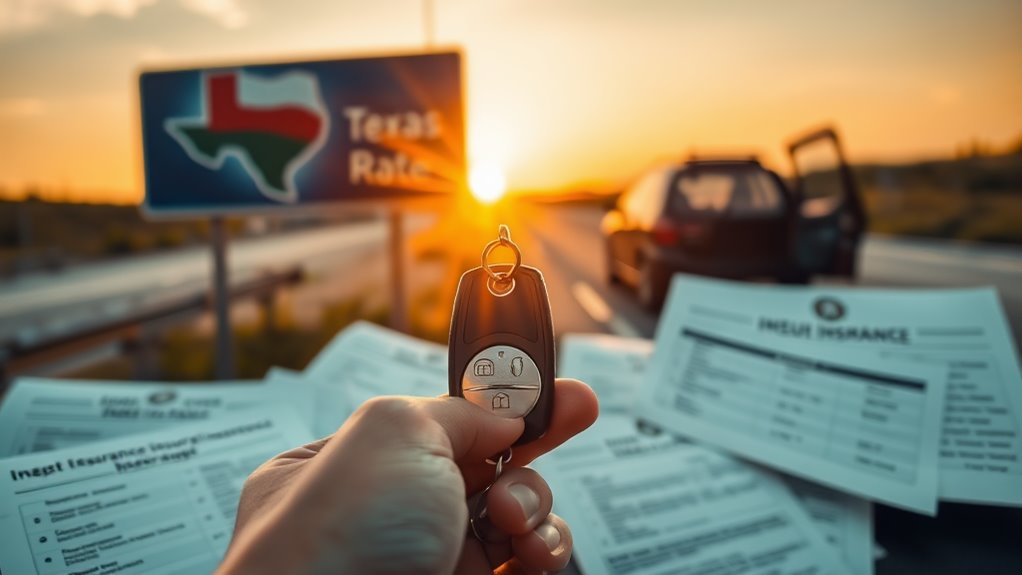
7 Best Affordable SR22 Insurance Providers in Texas
Finding SR-22 insurance in Texas can feel like maneuvering through a maze, but it doesn’t have to be overwhelming. Several providers offer competitive rates that can suit various budgets. From Mercury’s low monthly premiums to State Farm’s affordable non-owner coverage, there are options worth exploring. Understanding these choices can greatly impact your financial future, especially if you need to meet state requirements. Let’s examine the best affordable providers that could potentially save you money.
Key Takeaways
- Mercury offers SR-22 insurance starting at $50 monthly, significantly lower than the Texas average of $101 for minimum coverage.
- State Farm provides budget-friendly non-owner SR-22 coverage at $36 monthly, ideal for individuals without a vehicle.
- Texas Farm Bureau features SR-22 options around $65 monthly, cheaper than competitors like GEICO and Nationwide, with potential discounts available.
- Redpoint County Mutual has average monthly costs of $113, 52% cheaper than the Texas statewide average, focusing on high-risk driver affordability.
- GEICO delivers reliable SR-22 insurance with premiums between $115 to $214, influenced by driving history and offering non-owner policies.
Mercury: The Most Affordable SR-22 Insurance
When you’re looking for affordable SR-22 insurance in Texas, Mercury stands out as the most budget-friendly option available.
With rates starting at just $50 monthly for minimum coverage, Mercury’s pricing markedly beats the Texas average of $101. This makes it a leading choice for high-risk drivers needing to meet the state’s minimum liability requirements, which include $30,000 bodily injury coverage per person and $25,000 for property damage. Mercury also facilitates filing the SR-22 form directly with the Texas Department of Public Safety. Additionally, SR-22 insurance is specifically designed to help drivers reinstate their driving privileges after certain violations.
While other providers like Progressive and State Farm charge higher premiums, Mercury’s competitive rates guarantee you can maintain compliance with SR-22 requirements without breaking the bank, ultimately reducing your overall costs during this mandatory period. Additionally, maintaining continuous coverage is essential to avoid penalties or license suspension during the two-year SR-22 period.

State Farm: Budget-Friendly Non-Owner SR-22 Coverage
If you’re seeking budget-friendly non-owner SR-22 coverage in Texas, State Farm emerges as a top contender. With a monthly cost of just $36, their rates are considerably lower than the state average of $80. This translates to an annual cost of $429, making it a financially savvy choice for those needing non-owner coverage.
- Meets state minimum liability requirements
- Offers $30,000 bodily injury and $25,000 property damage coverage
- Ideal for individuals without a vehicle
- Acts as secondary coverage for borrowed vehicles
State Farm’s competitive pricing and extensive coverage options help guarantee that you can maintain your driving privileges without breaking the bank.
State Farm offers affordable rates and comprehensive coverage to help you keep your driving privileges intact.
Consider obtaining a quote to explore your options further.
Texas Farm Bureau: Cost-Effective SR-22 Options
Texas Farm Bureau stands out as a viable option for those seeking cost-effective SR-22 insurance in the Lone Star State. With competitive pricing, you can expect to pay around $65 per month for minimum coverage, while full coverage rates hover around $124, depending on your driving profile.
The liability coverage meets state minimums, which are $30,000 for bodily injury per person and $25,000 for property damage. While Texas Farm Bureau is generally cheaper than providers like GEICO and Nationwide, it may not be the lowest option available.
Additionally, there are potential discounts for bundling policies or completing defensive driving courses, which can further enhance cost efficiency. Always compare rates to find the best fit for your unique situation.
Redpoint County Mutual: Significant Savings on SR-22 Insurance
For those searching for affordable SR-22 insurance, Redpoint County Mutual emerges as a compelling choice due to its competitive pricing and considerable savings.
With average monthly costs around $113, Redpoint’s rates are approximately 52% cheaper than the Texas statewide average. Here are some key aspects to evaluate:
- Redpoint is authorized in Texas and adheres to state liability coverage requirements.
- Their SR-22 policies must be maintained for at least two years to avoid penalties.
- Redpoint focuses on providing economical options for high-risk drivers.
- Comparing quotes from different providers can yield further savings.
Opting for Redpoint can appreciably lessen your financial burden while ensuring compliance with state regulations.
GEICO: Reliable SR-22 Insurance at Competitive Rates
When considering SR-22 insurance options, GEICO stands out as a reliable provider that offers competitive rates tailored for various drivers. Their average monthly premiums range from $115 to $214, depending on your coverage needs.
GEICO’s policies meet Texas’s minimum liability requirements, ensuring compliance while you drive. Although GEICO’s rates are generally competitive, they may not always be the cheapest option available.
Factors influencing your premium include age, credit score, and driving history, with DUIs leading to higher rates. Additionally, GEICO offers non-owner SR-22 policies, ideal for those who don’t own a vehicle.
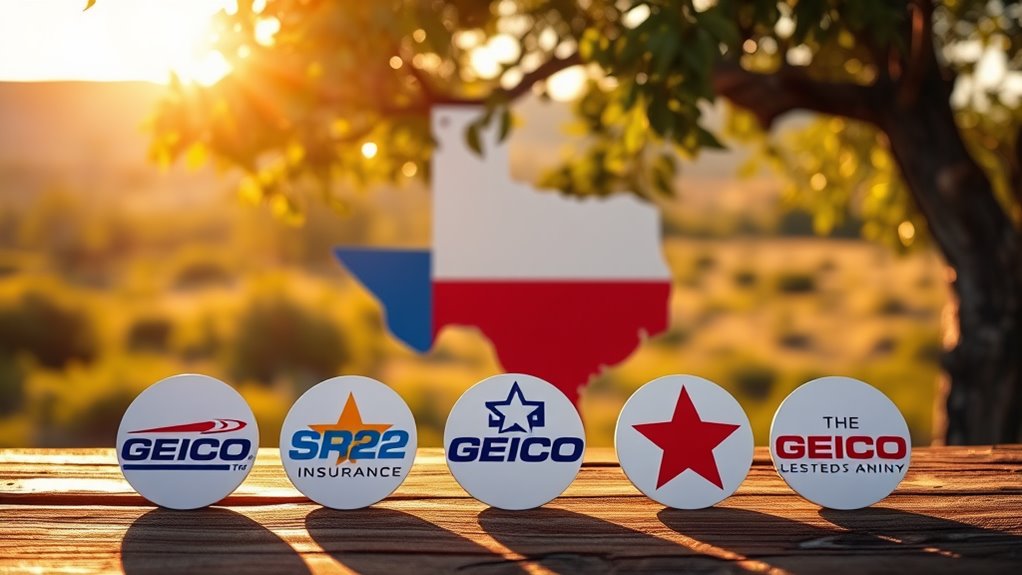
Progressive: Affordable Full Coverage SR-22 Insurance
Progressive offers a compelling option for drivers in need of affordable full coverage SR-22 insurance, with monthly premiums starting around $119. This competitive pricing includes various benefits that cater to different needs:
- Same-Day SR-22 Filing: Get your certificate quickly, expediting your license reinstatement.
- Comprehensive Coverage: Policies include liability and additional coverage options to enhance protection.
- Non-Owner Insurance: Ideal for those without vehicles, ensuring compliance without ownership.
- Discount Opportunities: Potential savings through defensive driving courses or policy bundling.
With a $25 filing fee and possible monthly surcharges, Progressive provides a flexible and efficient solution for those requiring SR-22 insurance in Texas.
Make sure to maintain coverage for the specified period to fulfill all state requirements effectively.
Allstate: Comprehensive Coverage With SR-22 Options
Allstate provides a robust option for drivers in Texas seeking extensive SR-22 insurance coverage, particularly for those with serious traffic violations. Their policies include both liability-only and full coverage options, ensuring thorough protection.
Costs can vary considerably, with annual rates for a DUI averaging around $2,931. Allstate’s rates are often competitive, but it’s wise to compare quotes due to the potential for increased premiums based on individual driving history.
 The company offers various discounts, like bundling home and auto insurance, to help lower costs. Importantly, Allstate maintains coverage for high-risk drivers without immediate policy cancellation, making it a reliable choice for those needing to fulfill SR-22 filing requirements while retaining essential coverage.
The company offers various discounts, like bundling home and auto insurance, to help lower costs. Importantly, Allstate maintains coverage for high-risk drivers without immediate policy cancellation, making it a reliable choice for those needing to fulfill SR-22 filing requirements while retaining essential coverage.
When seeking affordable SR-22 insurance in Texas, it’s essential to compare multiple providers to find the best fit for your needs. Notably, nearly 1 in 3 drivers in Texas may need SR-22 insurance at some point due to various driving infractions. This statistic highlights the importance of researching options like Mercury and State Farm, which offer competitive rates, ensuring you meet state requirements without breaking the bank. Don’t overlook the potential savings available from these providers.
Top 5 Advantages of Non-Owner Insurance
Imagine you occasionally borrow a friend’s car for weekend trips but don’t own a vehicle yourself. In this scenario, non-owner insurance can be a practical solution. It not only provides affordability with lower premiums but also offers flexibility and extensive liability coverage. Understanding these advantages can help you make informed decisions about your insurance needs. So, what are the specific benefits that non-owner insurance brings to your driving experience?
- Non-owner insurance offers lower premiums compared to traditional auto policies, making it more affordable for occasional drivers.
- It provides flexibility to drive various vehicles without needing to change insurance or purchase additional coverage.
- The policy meets state minimum liability requirements, ensuring legal compliance and financial protection in accidents.
- It simplifies renting or borrowing vehicles by often being cheaper and reducing the hassle of buying insurance each time.
- Non-owner insurance ensures continuous coverage, which is crucial for fulfilling state requirements and avoiding fines or license suspension.
Affordability of Non-Owner Insurance
Affordability stands out as a key benefit of non-owner insurance, making it an attractive option for occasional drivers. This type of insurance generally comes with lower premiums compared to traditional auto policies, particularly beneficial for those who don’t drive frequently. By purchasing non-owner insurance, you can also save on rental car insurance costs, simplifying expenses when renting vehicles. Additionally, these policies allow for customizable deductibles, potentially lowering out-of-pocket costs. Non-owner insurance meets state minimum coverage requirements at a reduced price and eliminates vehicle ownership costs. Factors like state jurisdiction and driving history can further influence affordability, but overall, non-owner insurance provides a budget-friendly solution for drivers who need flexible coverage without the financial burden of traditional policies. Moreover, the national average cost for non-owner insurance is lower than for standard minimum coverage, enhancing its appeal to budget-conscious drivers. In Texas, maintaining an SR-22 insurance requirement can also increase the need for affordable coverage options, making non-owner insurance a viable choice.

Flexibility for Occasional Drivers
Non-owner insurance provides a unique level of flexibility that caters specifically to occasional drivers. This policy allows you to drive various vehicles without needing to change your insurance, making it highly adaptable.
When renting a car, you won’t have to purchase additional insurance, saving time and money. Plus, you’re covered when you borrow a friend’s or family member’s vehicle, ensuring you’re protected in diverse situations.
You can cancel your policy at any time without penalties, a feature that traditional insurance doesn’t typically offer. Additionally, non-owner insurance meets state requirements for liability coverage, giving you peace of mind while driving, even without owning a vehicle.
This flexibility is invaluable for those who drive infrequently but want reliable coverage.
Comprehensive Liability Coverage
Extensive liability coverage acts as an essential safety net for occasional drivers, ensuring financial protection in the event of an accident while using a borrowed or rented vehicle.
This coverage not only meets state-mandated minimum liability requirements but also shields your personal assets from potential claims. It includes bodily injury coverage, which addresses injuries to others, and property damage coverage for any damage incurred during an accident.
Additionally, many policies offer extended options, like uninsured or underinsured motorist coverage, enhancing your protection.
Convenience for Renters and Borrowers
When you frequently rent or borrow vehicles, having a dedicated insurance policy can streamline your experience and enhance your protection.
Having a dedicated insurance policy simplifies renting or borrowing vehicles while boosting your protection.
Here are some key conveniences of non-owner insurance:
- Cost Savings: It’s often cheaper than repeatedly purchasing insurance from rental companies.
- Reduced Administrative Burden: You won’t need to buy insurance every time you rent a vehicle.
- Peace of Mind: You’ll have financial protection against unexpected accidents while driving.
- Flexible Coverage Options: You can customize your policy with additional coverages like uninsured motorist protection.
Legal Compliance and Continuous Coverage
Although many drivers may not own a vehicle, maintaining legal compliance and continuous coverage is essential for protecting against potential liabilities.
If you’ve had serious offenses like DUI or reckless driving, fulfilling state insurance requirements becomes important. This often involves filing an SR-22 form, verifying your financial responsibility.
Non-owner insurance can help prevent fines or license suspension while providing proof of insurance during traffic stops. Additionally, it guarantees you have uninterrupted coverage, which is significant if you’re between vehicles or looking to reinstate your license.
Conclusion
To sum up, non-owner insurance offers a practical solution for those who drive without a personal vehicle. With premiums that are often 30% lower than traditional policies, it’s an affordable choice that doesn’t compromise on coverage. Plus, it provides the flexibility to drive various vehicles without hassle. Statistically, approximately 15% of drivers rely on non-owner insurance, highlighting its growing popularity. By choosing this option, you can secure peace of mind while on the road without breaking the bank.

 Violet Craig
Violet Craig
 Violet Craig
Violet Craig
 Violet Craig
Violet Craig
 Violet Craig
Violet Craig
 Violet Craig
Violet Craig























































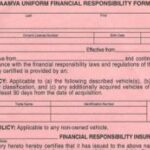





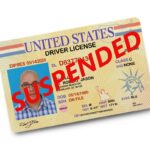




















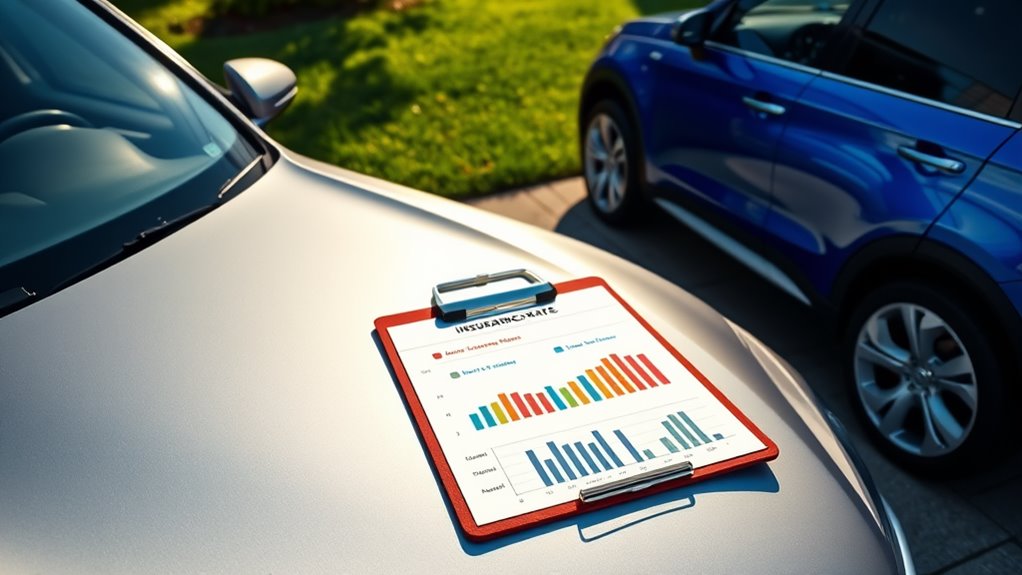



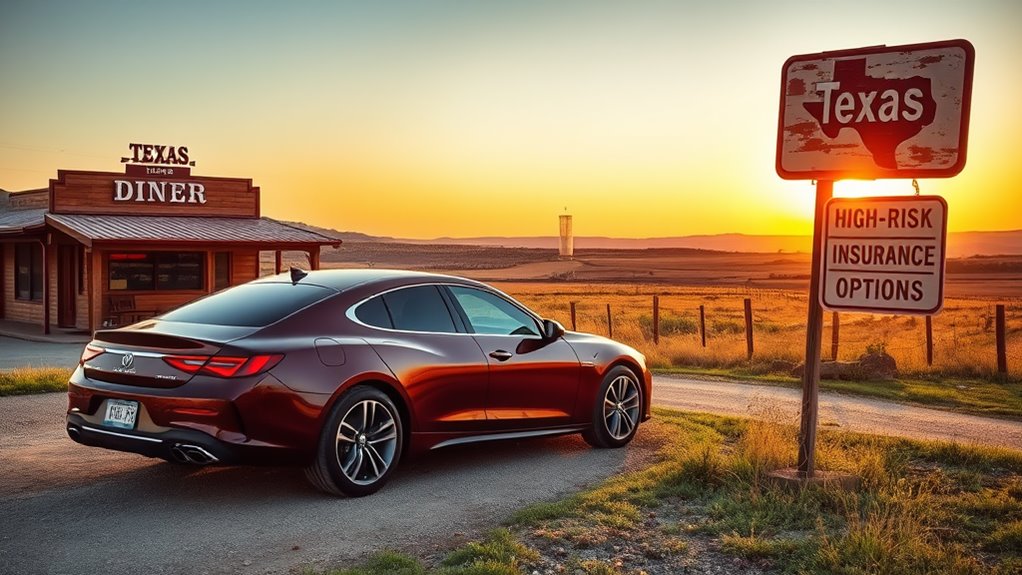

 The company offers various discounts, like bundling home and auto insurance, to help lower costs. Importantly, Allstate maintains coverage for high-risk drivers without immediate policy cancellation, making it a reliable choice for those needing to fulfill SR-22 filing requirements while retaining essential coverage.
The company offers various discounts, like bundling home and auto insurance, to help lower costs. Importantly, Allstate maintains coverage for high-risk drivers without immediate policy cancellation, making it a reliable choice for those needing to fulfill SR-22 filing requirements while retaining essential coverage.
